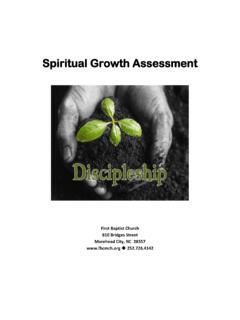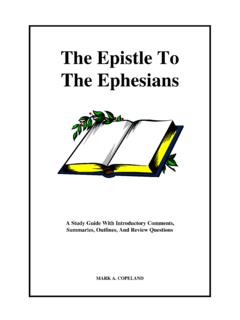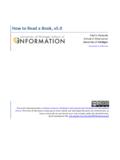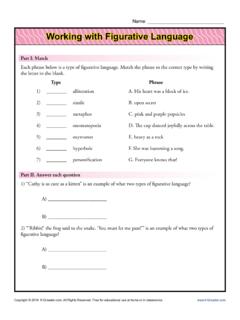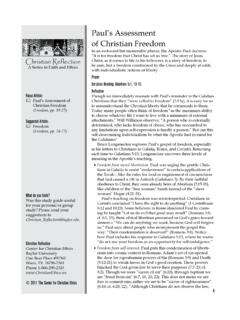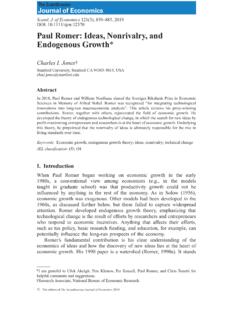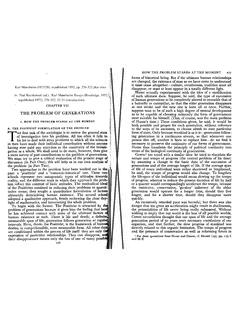Transcription of Deontological Ethics: Summary (c) 2019 Dr. Paul R ...
1 Deontological Ethics: An Action is right iff it is in accord with a moral duty, principle, or rule. It is a rule-based approach Central question: what should I do? "Deontology" comes from Greek word deon meaning binding duty. Advantages: (1) Fairness, consistency, & morally equal treatment of all people for they are intrinsically valuable; (2) emphasizes the Law of Non-contradiction; you would not will anything that is not rational; (3) emphasizes doing what is morally right (it is your duty); (4) universally binding & impartial-in order for an action to be morally permissible, you have to be able to will it for it all. Disadvantages: (1) No clear way to resolve moral duties when they come into conflict with each other; (2) consequential moral systems in disguise enshrined in customs & law have been known to give the best consequences; (3) does not readily allow for gray areas because they are based on absolutes; (4) which duties qualify given time or location: are old duties still valid?
2 (5) human welfare & misery: Some principles may result in a clash with what is best for human welfare & prescribe actions which cause human misery; (6) rule worship: the refusal to break a generously beneficial rule in those areas in which it is not most beneficial is rule worship; (7) exclusive focus on rationality ignores our relations to & with other human beings.(3) Intuitionism: An action is right iff you obey the prima facie duty that becomes a duty proper or binding duty in a given situation. Advocated by Sir W. D. Ross (1877-1971) in the Right and the Good (1930), this type of objectivist type of rule intuitionism claims that a significant set of moral principles are self-evident to us (pluralistic account of duties). We have an intuitive knowledge (internal perceptions) of the rightness & wrongness of acts.
3 Intuition presents us with prima facie duties, a Latin word meaning on first appearance or on the face of it. Ross identifies 7 prima facie duties: (1) fidelity: keeping one s promises; (2) reparation: making up for wrongs done to others; (3) gratitude (gratefulness & return the same); (4) non-injury (no harm to others); (5) justice (present or correct mismatch between person s pleasure or happiness & their merit); (6) beneficence (generosity), & (7) self-improvement (improving one s condition). When you have to make a moral decision in a situation where prima facie duties come into conflict with each other, one prima facie duty will become the objective, overriding duty to obey; the conditional prima facie duty will become unconditional, a duty proper, in that given circumstance. Among all the other prima facie duties, you will be able to identify which one becomes the weightiest.
4 Situational setting drives which conditional duty becomes unconditional; it will be self-evident via intuition which one to follow-& you are obligated to follow : (1) Deontological yet not rigid in view of using what prima facie duty will be most apropos (2) Appeals to common sense. We don t get tangled up in ethical theory, complex models, & confused by moral speculation. (3) Intuition about what is right & wrong have a distinctive force that is appealing; (4) Acknowledges real moral conflicts between duties & offers relief by following what is most weighty in a given situation; (5) Sensitive to context & behooves to take situational setting very seriously, carefully, & reflectively. Disadvantages: (1) List of prima facie duties is not complete & does not follow a logical step-by-step procedure; (2) Provides no principle for determining what our actual moral obligations are in a particular situation.
5 (3) List of prima facie duties is without justification; how can we be sure the list is accurate? (4) Don t our intuitions change over time, space, & culture? (5) people have different intuitions about moral issues? (6) Is there a better procedure to follow to know which duties to trust instead of reliance upon intuition? (2) Kantian Ethics: An action is right iff it is in accord with the Categorical Imperative, that is, the supreme principle of morality. Immanuel Kant (1724-1804) offers 3 formulations-which may be seen as a threefold way of considering the secularization of Love your neighbor as yourself or Do unto others as you would have them do unto you. First Formulation: Act in conformity with the maxim and the maxim only, that you can will at the same time a universal law. This means that what you consider doing, it must be something that you can will or accept that all do (universal); it is replacing individual preferences with purely universal terms.
6 Second Formulation in such a way that you treat humanity, whether in your own person or in that of another, always an end and never as a means only. In sum, every person has intrinsic value & that humanity is a limit or constraint on your action. Third Formulation: Therefore, every rational being must act as if he were though his maxim always a legislating member in the universal kingdom of ends. You have to will what is consistent with the operations of the kingdom as a whole. All people should consider themselves as both members & heads. Hypothetical Imperatives are instrumental, means-end imperatives that are expressive of the goals you personally want to achieve: if you want A, then do B ( , if you want to make an A+ in this course, meet & exceed course objectives, study a little bit every day, & regularly meet with your professor.)
7 (1) Natural, Moral Law: An action is right iff it is in accord with natural, moral laws. In sum, we are designed to be moral. At some level we all know what is right from wrong & good from what is evil. The issue is not moral skepticism but suppression of what we already know is real, true, & good. This family of theories is rich in both Judaism & Christianity ( , Apostle paul ; Aquinas) & in Greek, Roman, & Stoic thought ( , Aristotle; Stoicism). There are foundational moral principles which are not only right for all, but at some level known to all. They are right for everyone everywhere. Natural law is (1) not made by human beings; (2) based on the structure of reality; (3) the same for every human & at all times; (4) unchanging rule or pattern which is there for humans to discover; (5) naturally knowable; (6) it is a standard means by which individuals & communities can be enriched & rewarded; (7) affirms conscience within; applauds you when you do good things & condemns you when you do what is wrong.
8 Advantages: (1) Primary precepts are ethically evident & considered to be right & good across societies, time, (2) universally applicable ( , race, age, or gender); (3) Coheres with harmony, order, rationality, & universal responsibilities: reason coheres with nature; (4) focuses on the development of virtue, flourishing unto goodness, & promotes cardinal virtues: courage, justice, wisdom (prudence), & self-control; (5) cultivates interfaith dialogue between religious faiths given shared appreciation & importance to natural, moral law; (6) every person possesses inherent dignity; (7) emphasizes natural, physical, & social harmony; (8) judges the intrinsic values of actions: (9) natural, moral law is based on reason; it is open to anyone, whether religious or not; (10) Based on what it means to be human; (11) applicable to international ethics; (12) appeals to the intrinsic ideas/values of what is right & wrong.
9 Disadvantages: (1) Difficult to provide step-by-step instructions from basic guiding principles; (2) Depends upon reason without considering other factors that can affect proper reasoning; (3) cultural relativism, evolution, & perspectivalism challenges idea that we possess a common fixed nature; (4) Precepts are too general; (5) Morals differ from society to society; (6) People change given the bilateral transactional relationship between personhood (becoming) & environment; (7) Recognition of duties & values whose origins is beyond humanity (God; Nature). Deontological Ethics: Summary (c) 2019Dr. paul R. Shockley









